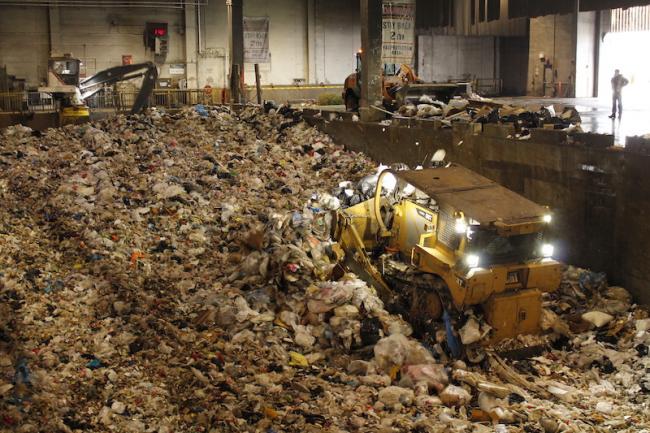Articles Menu

Jan. 21, 2022
Marc Lee is a CCPA-BC senior economist. Belinda Li is a solid waste management consultant. Sue Maxwell is a sustainability consultant. Tamara Shulman is a waste reduction planning consultant.
British Columbia is ahead of most North American jurisdictions in implementing composting and recycling programs. Yet, we are systemically burdened by endless amounts of packaging, especially the mass proliferation of plastic, which is an environmental tragedy of our times.
B.C. shares the core problem with other jurisdictions. We have a culture of consumption and an extraction-oriented economic system. Both contribute to solid waste, pollution and climate change.
The updated CleanBC climate plan calls for a “circular economy” as part of the effort to reduce greenhouse gas emission reductions. “A system where, by design, there is no waste… the circular approach emphasizes sharing, reusing, repairing and recycling.”
There is potential to reduce emissions through better recycling programs and redesign and reuse of products and materials so that wastes become inputs into production. The term “circular economy,” however, has been embraced by large business interests that emphasize technological solutions, still predicated on an extractive economy. We need to break from a relentless extraction mindset that is pushing environmental limits in many ways, including for climate change.
Our Zero Waste Agenda for BC report places much greater emphasis on upstream, proactive solutions, rethinking systems, aggressive materials reduction, redesign and reuse before recycling and composting.
B.C.’s recycling activities are heavily integrated into global markets where recycled materials are just another low-value commodity. We advocate moving beyond conventional recycling to get serious about well-designed conservation and materials management policies that can simultaneously support GHG emission reductions and local economic development.
Achieve zero waste by 2040
B.C. can build on existing strengths, change systems and abandon wasteful consumption habits. We propose zero waste as a goal for 2040.
This should start with aiming for dramatic reductions in waste production, including banning single-use packaging and embracing reusable packaging and food and beverage containers. To date, companies have not had to design their products and packaging with reuse in mind. Relying on a recycling model clearly has major limitations.
We need bold policies to support repair and maintenance, in particular for electronics and appliances. The “Right to Repair” movement points the way towards longer life of products while creating local jobs.
Tougher regulations are needed for more co-ordinated and effective materials management (recycling and compost) at the end of life and for greater local processing and higher labour standards.
Many communities underserved by existing programs
Recycling in B.C. is primarily delivered by programs that require producers to take back materials, known as extended producer responsibility. But many communities are underserved by existing programs and a significant amount of products and packaging are not yet regulated. These programs are failing to meet their mandate on redesign, reduction, reuse and repair.
Raising the bar on extended producer responsibility is key to ensuring products and packaging can be used and reused and not added to the waste stream. It can also ensure high employment standards and decent work.
To increase local economic benefits and ensure high-quality, fairly priced service across B.C., a stronger public presence is needed. A new zero-waste Crown corporation could fill in gaps in the system. It could co-ordinate community-level collection depots (including rural areas), create more standardized collection bins and take on collection for B.C. government operations.
Strong public action needed
The public sector can play a strong role in generating local demand for lower consumption products and recycled materials. Stronger public procurement policies and minimum requirements for recycled content would drive demand and keep more materials in B.C. for processing and jobs.
Additionally, more system-wide planning and data collection in the public domain is required to shine a light on where materials flow after consumption, including recycling and composting, landfills and incineration and GHG impacts.
We need to phase out no-win options like incinerating waste materials. Closing disposal loopholes could be integrated with bans on materials that do not fit into this system (such as single-use plastic films) or adding disposal surcharges.
New regulatory frameworks are needed in two pressing areas: plastics and construction/demolition waste.
Climate action and green jobs
Key to a zero-waste goal is maintaining a high standard of living while dramatically shrinking required energy and material (fossil fuels, electricity, wood products, minerals and metals) that flow into the economy and the wastes (solid and liquid waste, air pollution and carbon emissions) that flow out.
Fortunately, B.C. has a breadth of experience and successes in existing collection systems and extended producer responsibility programs and the CleanBC framework is beginning to address plastic waste. The next stage involves scaling up and strengthening these systems and linking them to climate action and creating new green jobs.
Zero Waste in the Time of COVID - Read More
Reducing, Reusing and Recycling Is Easy — Except in Rural BC - Read More
[Top photo: The Vancouver South Waste Transfer System handles anywhere from 400 to 1,300 tonnes of waste in a single day. Photo by Michelle Gamage.]